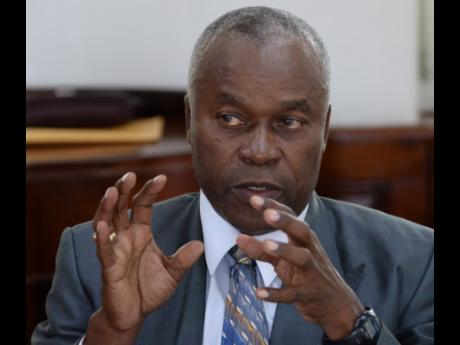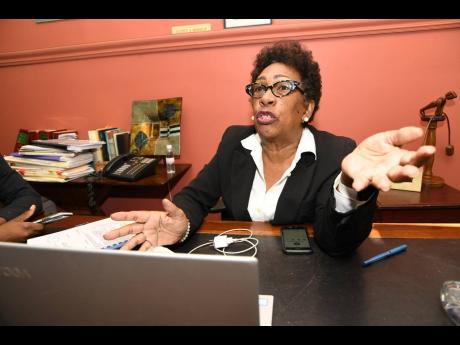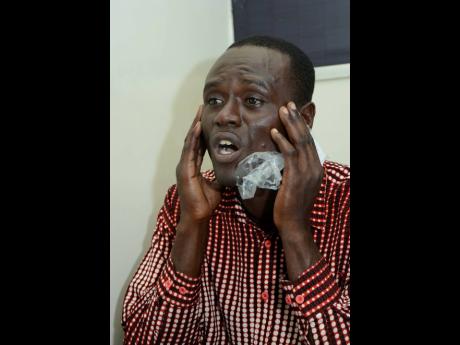Body free, mind in prison
Gov’t urged to help man unjustly incarcerated for 12 years, compensate persons wrongly accused
Strong support has come from the Advocates’ Association of Jamaica for the Government to make an ex gratia payment to a man who, at age 18, was incarcerated for 12 years for a crime he did not commit, and was eventually freed 11 years ago....
Strong support has come from the Advocates’ Association of Jamaica for the Government to make an ex gratia payment to a man who, at age 18, was incarcerated for 12 years for a crime he did not commit, and was eventually freed 11 years ago.
Shabadine Peart, 41, who was freed of murder charges, said he has been facing many challenges since he regained his freedom and disclosed that he has suicidal thoughts at times. Peart said he has written letters to various government offices seeking help, but has not received any response.
“I live daily the terrible situation of prison life all because of false evidence,” Peart told The Sunday Gleaner last week.
“But although life is a struggle for me, I am not going to be involved in crime because I believe in honesty and justice.”
A witness had testified that she heard Peart and three other men planning to murder a security guard in May 1999 and saw them with a gun. The witness said she also heard the men saying they had committed the murder, which Peart denied. However, there was no eyewitness to the murder of the security guard or any scientific evidence to support the allegations.
“In my capacity as president of the Advocates’ Association of Jamaica, I am firmly of the view that Peart could be offered some form of ex gratia payment in the circumstances where an accused man has spent 12 years in prison and the traumatic experience has rendered him virtually disabled,” said attorney-at-law Leonard Green.
“It would be in the public interest for Peart to be given a humane award for the loss and damage that he has suffered.”
Attorney-at-law Bert Samuels also views Peart’s case as one that is fitting for an ex gratia payment since the six-year period in which he had to file a suit against the Government passed while he was in prison.
“So the question is: can the attorney general, on his own initiative, where there is a case of gross injustice particularly to a young person, take initiative in those matters?” Samuels queried.
The lawyer referred to the 1993 English case of The Queen v Judith Ward, in which he said when the attorney general heard that an injustice was done to her, he took the case to the Court of Appeal way outside the normal period allowed for an appeal and her convictions were quashed.
Samuels explained that an ex gratia payment was not compensation, but was a show of contrition and regret and must come with an apology for what had happened. He reiterated that it was now for Jamaica’s attorney general to take the initiative and say “an injustice was done, let us give him an ex gratia payment”.
“Many litigants find themselves falling outside the six-year limitation period because massive delays take the cases outside the limitation period,” Samuels said.
GOOD POLICY
Attorney-at-law Oswest Senior Smith, who represented Kemoy Kesto from St Ann, who was freed this year by the Court of Appeal after spending four years in prison because of judicial error and negligence on the part of the prosecution and the police, is agreeing that Peart should be compensated by the State.
“It would seem to me, particularly in the much-heralded new dispensation, that it could only be good policy, pragmatic and just, for the Attorney General’s Chambers to consider awarding, in appropriate matters, ex gratia payments to those whose convictions are overturned by the Court of Appeal or the United Kingdom Privy Council,” said Senior Smith.
He said with such a regime in place, it would obviate the need for an additional clog in the court system, with a number of such cases meandering their way through the various stages of usually torturous litigation.
“Alternatively, an ad hoc or some other institutionalised committee chaired by a retired member of the higher judiciary, and including representatives of the Attorney General’s Chambers, could be established and specifically purposed in that regard,” he suggested.
Senior Smith said further that litigants who are so aggrieved could then make their case for due compensation to that body.
“The rigours, the stops and starts, the stresses and strains, the expenses of the formal justice system could thus be circumvented,” he added.
“So, when I ruminate on the fate of some of our citizens, for example, Shabadine Peart (in whose name is founded a significant legal precedent), I believe that they could well be recompensed through the deliberations of such a committee or by ex gratia payouts.”
Senior Smith also noted that, “The society in general may well profit from there being fewer of our citizens ‘living while enraged’. Equally, it is not far-fetched to conceive of psychological support being formally offered to especially those eventually found to have been wrongfully convicted. Much assistance is required for any smooth reintegration into society.”
LIARS SHOULD PAY
Queen’s Counsel Valerie Neita Robertson, who represented policeman Lescene Edwards who was freed by the United Kingdom Privy Council in April because fresh scientific evidence showed that he could not have murdered the mother of two of his children, sees the need for urgent constitutional reform to protect citizens from injustice.
She said one of the things that constitutional reform should take into account is that if the court finds that someone was falsely prosecuted, did not get a fair trial or justice was not done, then there should be some compensation.
“Constitutional reform will stop the police from putting certain cases before the court in instances where persons give their alibi, it is checked out and found to be true and it is clear the witnesses lied,” Neita Robertson said.
Queen’s Counsel Peter Champagnie, who represented 32-year-old Raheem Panton who spent a year in custody because two police inspectors gave false testimony that they held him with a firearm, agrees that Peart should be given an ex gratia payment.
Panton was freed in the Gun Court last year of illegal possession of firearm and ammunition after Champagnie presented video evidence to prove that the policemen were lying.
Champagnie went further to say that witnesses who give false testimony should be made to pay court costs and compensation to the accused.
He said, “What is required is legislation by instant redress, for a trial judge to award costs against a witness whose testimony has been found to be false. Costs should go directly to an accused person.”
The attorney added, “Additionally, there needs to be prosecution of those who commit perjury. It is not enough to give open condemnation of such witnesses and labelling them as merely lacking credibility.”



